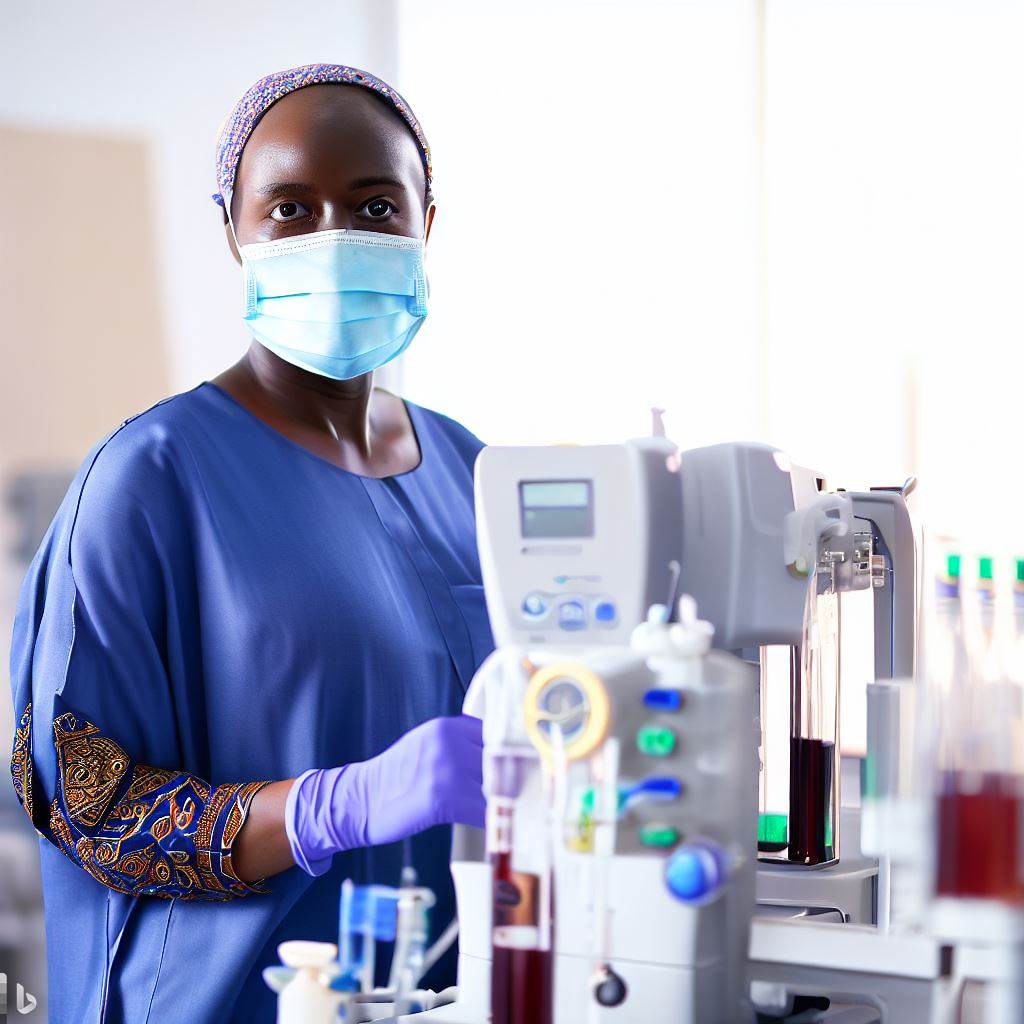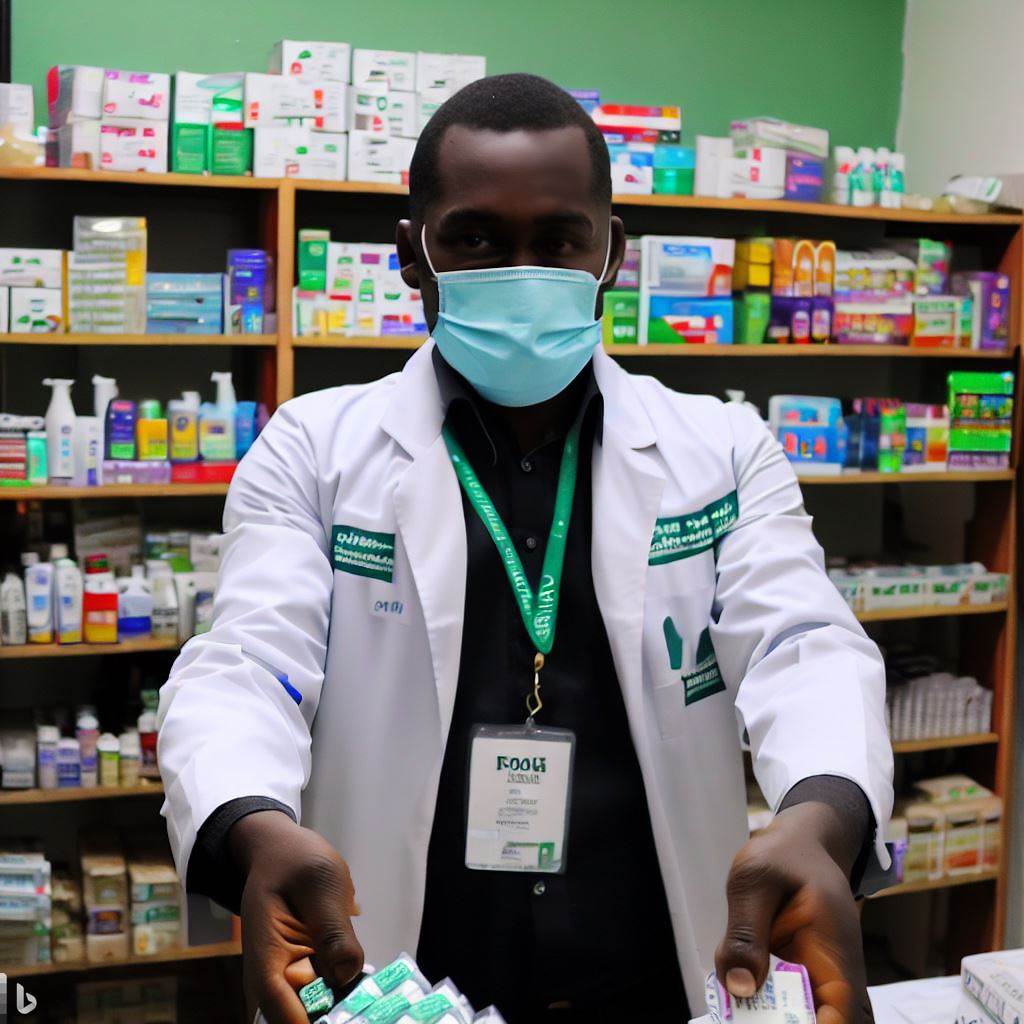Introduction
Phlebotomy in Nigeria entails extracting blood for medical use, vital for diagnosis and treatment. Challenges and rewards explored.
Thesis Statement
The practice of phlebotomy in Nigeria presents practitioners with both challenges and rewards.
Phlebotomy, the process of drawing blood for medical testing, is an essential procedure in Nigeria’s healthcare system.
It involves skilled professionals, known as phlebotomists, collecting blood samples from patients. Besides being a routine medical process, phlebotomy holds significant importance in the medical field.
Firstly, phlebotomy is vital in diagnosis. Blood samples provide valuable information about a patient’s health, aiding doctors in determining existing medical conditions, diseases, and infections.
With accurate diagnostic results, prompt and effective treatment plans can be implemented, saving lives and improving patient outcomes.
Secondly, phlebotomy is essential in monitoring ongoing medical treatments.
By regularly collecting blood samples, medical professionals can assess the effectiveness of medications and make necessary adjustments.
This helps in managing chronic illnesses, such as diabetes or cancer, ensuring patients receive proper care and the best possible outcomes.
However, phlebotomy in Nigeria is not without its challenges. Limited resources and equipment shortages create hurdles for practitioners.
Proper sterilization techniques and safe disposal protocols are sometimes compromised, which poses potential health risks to both patients and phlebotomists.
Despite these challenges, there are also rewards inherent in the practice of phlebotomy.
The satisfaction of making a difference in patients’ lives, contributing to their well-being, and being a crucial part of the healthcare system is immensely rewarding for practitioners.
Additionally, the demand for skilled phlebotomists in Nigeria is high, providing ample job opportunities and career growth prospects.
In the end, phlebotomy plays a critical role in Nigeria’s medical field, offering invaluable insights for diagnosis and treatment.
Although the practice may present challenges, the rewards are plenty for dedicated practitioners seeking to contribute to the well-being of Nigerian patients.
Read: Day in the Life: A Nigerian Phlebotomist Shares Experience
Challenges of Phlebotomy in Nigeria
Phlebotomy, the practice of drawing blood from patients for various diagnostic purposes, is an essential procedure in healthcare.
However, performing phlebotomy in Nigeria comes with its own set of challenges.
This section will discuss the significant challenges faced by phlebotomists in Nigeria and their implications for healthcare delivery and patient outcomes.
Lack of awareness and understanding among the general population
One major hurdle faced by phlebotomy practitioners in Nigeria is the lack of awareness and understanding among the general population.
Many Nigerians are unaware of the importance of blood tests for diagnosis, leading to a reluctance to undergo phlebotomy procedures when recommended by healthcare professionals.
This lack of awareness poses a significant barrier to effective healthcare delivery in the country.
Limited access to proper training and education
Another challenge is the limited access to proper training and education on phlebotomy techniques.
The shortage of qualified trainers and accredited educational institutions offering comprehensive phlebotomy courses hinders the development and standardization of phlebotomy practices in Nigeria.
This limitation compromises the quality and safety of blood collection procedures.
Insufficient infrastructure and resources in healthcare facilities
Nigeria’s healthcare system suffers from insufficient infrastructure and resources, which significantly impacts phlebotomy services.
Inadequate laboratory facilities, including poorly maintained or non-functional equipment, create challenges for phlebotomists in performing accurate and timely blood collection.
The lack of access to necessary supplies and proper waste disposal systems also poses a risk to both healthcare workers and patients.
Cultural beliefs and misconceptions related to blood collection
Cultural beliefs and misconceptions related to blood collection further compound the challenges faced by phlebotomy practitioners in Nigeria.
Some individuals associate blood draw with spiritual beliefs or fear that donating blood may lead to personal harm.
These cultural beliefs and misconceptions can result in resistance or refusal to undergo phlebotomy, hampering the diagnostic process and overall healthcare outcomes.
Language barriers and communication issues
Language barriers and communication issues between healthcare professionals and patients pose another significant challenge in phlebotomy.
Nigeria is a diverse country with over 500 ethnic groups, each with its own languages and dialects.
This diversity makes effective communication between healthcare workers and patients difficult, leading to misunderstandings and potential errors during blood collection procedures.
High prevalence of bloodborne diseases and safety concerns
Lastly, Nigeria has a high prevalence of bloodborne diseases, such as HIV, hepatitis B, and hepatitis C.
This poses significant safety concerns for phlebotomists, who must ensure adequate infection control measures during blood collection.
The risk of accidental needlestick injuries or exposure to infectious blood is heightened due to insufficient resources, lack of awareness, and inadequate training on proper safety protocols.
In conclusion, performing phlebotomy in Nigeria presents numerous challenges that hinder effective healthcare delivery.
The lack of awareness and understanding among the population, limited access to training and education, insufficient infrastructure, cultural beliefs and misconceptions, language barriers, and safety concerns all contribute to these challenges.
Addressing these issues through increased awareness, improved training programs, investment in healthcare infrastructure, and cultural sensitivity can greatly enhance the practice of phlebotomy and promote better healthcare outcomes in Nigeria.
Read: Top Institutions to Study Phlebotomy in Nigeria
Rewards of Phlebotomy in Nigeria
Contributing to the improvement of healthcare services
Phlebotomists play a vital role in the healthcare system, ensuring proper blood collection for accurate diagnoses.
Their skillful work contributes to better treatment plans and enhances overall patient care. By providing high-quality blood samples, phlebotomists facilitate timely and effective medical interventions.
Opportunity to save lives through accurate blood collection
The precise and safe collection of blood samples is crucial for diagnosing various medical conditions. Phlebotomists directly impact patient outcomes by ensuring accurate test results for timely treatment.
Their proficiency reduces the risk of misdiagnoses and enhances the chances of successful interventions.
Professional growth and development in a specialized field
Pursuing a career in phlebotomy opens doors to a specialized healthcare field with continuous learning opportunities.
Phlebotomists can expand their skills through certifications and workshops, advancing their careers. Specialization in this area can lead to exciting opportunities in research or supervisory roles.
Job stability and increasing demand for qualified phlebotomists
With the expanding healthcare industry in Nigeria, the demand for skilled phlebotomists is on the rise. Job stability is a significant advantage, offering security in an ever-growing field.
Qualified phlebotomists can expect rewarding employment opportunities in hospitals, clinics, and laboratories.
Satisfaction from providing a valuable service to patients and healthcare providers
Phlebotomists derive immense satisfaction from helping patients and contributing to their well-being.
They play a crucial role in the diagnostic process, making them essential members of the healthcare team. The gratitude from patients and healthcare providers serves as a rewarding aspect of their job.
In short, phlebotomy in Nigeria offers numerous rewards. Phlebotomists are integral to healthcare services, saving lives through accurate blood collection and experiencing professional growth in a specialized field.
Job stability and increasing demand ensure a secure career, while the satisfaction of providing a valuable service to patients and healthcare providers makes this profession truly fulfilling.
Read: Future Prospects: The Evolution of Pharmacy in Nigeria

Strategies to Overcome Challenges
Phlebotomy in Nigeria faces various challenges, but there are strategies that can be employed to overcome these obstacles.
By implementing these strategies, the rewards of phlebotomy can be maximized, and the healthcare system can benefit from a well-trained and efficient workforce.
Raising awareness through educational campaigns and community outreach
A major challenge in phlebotomy is the lack of awareness and understanding in the community. To address this, educational campaigns and community outreach programs can be organized.
These initiatives will help to inform the public about the importance of phlebotomy and its role in healthcare.
Advocating for better training programs and curriculum development
To ensure better training for phlebotomists, advocacy for improved training programs and curriculum development is crucial.
This can be achieved through collaborations with relevant institutions and organizations. By advocating for better training, the quality of phlebotomy services will improve, leading to better patient outcomes.
Collaborating with international organizations to improve infrastructure and resources
Collaboration with international organizations can also help improve the infrastructure and resources available for phlebotomy in Nigeria.
Through these partnerships, funding and technical support can be obtained to enhance phlebotomy services.
This collaboration will also facilitate the exchange of knowledge and best practices, further benefiting the phlebotomy sector in Nigeria.
Promoting cultural sensitivity and addressing misconceptions through communication efforts
Cultural sensitivity is an important aspect of phlebotomy, as cultural beliefs and practices may influence the acceptance and participation of individuals.
Efforts should be made to promote cultural sensitivity and address misconceptions about phlebotomy. This can be achieved through effective communication and engagement with local communities.
Implementing comprehensive safety protocols and guidelines
Ensuring the safety of both phlebotomists and patients is paramount. Implementing comprehensive safety protocols and guidelines is essential to prevent the spread of infections and ensure the smooth operation of phlebotomy procedures.
Regular training and monitoring of adherence to these protocols should be conducted to maintain a safe working environment.
In a nutshell, overcoming the challenges in phlebotomy in Nigeria requires a multi-faceted approach.
Raising awareness, advocating for better training programs, collaborating with international organizations, promoting cultural sensitivity, and implementing comprehensive safety protocols are all strategies that can contribute to the success of phlebotomy in Nigeria.
By implementing these strategies, the rewards of phlebotomy will be realized, leading to improved healthcare services and better patient outcomes.
Read: Earnings and Salaries: How Much Does a Pharmacist Make in Nigeria?
Conclusion
The challenges and rewards of phlebotomy in Nigeria present a complex landscape for healthcare professionals.
The lack of training opportunities, poor infrastructure, and inadequate resources pose significant challenges to the practice of phlebotomy in the country.
However, despite these obstacles, there are significant rewards to be gained from pursuing a career in phlebotomy in Nigeria.
The opportunity to make a tangible impact on patient care, contribute to the diagnosis and treatment of diseases, and play a crucial role in healthcare settings provides immense satisfaction.
Addressing the challenges faced by phlebotomists in Nigeria is vital for the growth of the profession.
Governmental support, increased funding for training programs, and the establishment of standardized practices can greatly improve the quality of phlebotomy services in the country.
For individuals interested in pursuing a career in phlebotomy in Nigeria, there is a need for determination, perseverance, and a passion for delivering excellent patient care.
Despite the challenges, the field of phlebotomy offers immense fulfillment and an opportunity to contribute to the overall well-being of individuals.
While there are challenges to overcome, the rewards of phlebotomy in Nigeria make it a worthwhile profession to pursue.
By addressing the challenges and fostering growth in the field, individuals can make a significant impact on healthcare delivery in the country.




